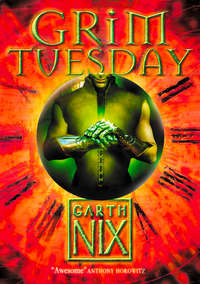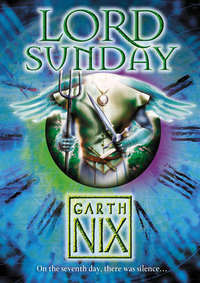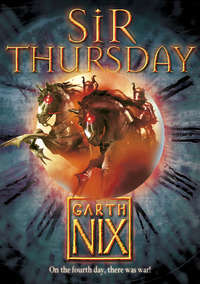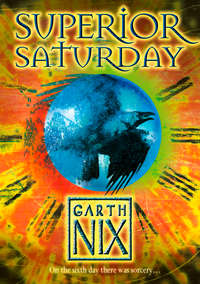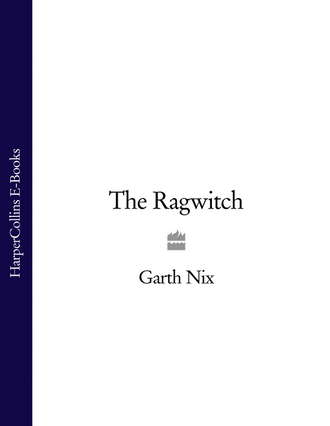
Полная версия
The Ragwitch
“Err…that sounds very nice,” said Paul, who was thinking Tanboule didn’t seem so much wise as mad. Still, he did seem to be on Rhysamarn mountain…
Obviously encouraged by the mention of supper, Tanboule took off up the slope at once, easily outpacing Paul with his long strides. Unlike Aleyne, he didn’t stop for Paul to catch up with him and was soon a dark speck against the grey shale. Paul struggled on angrily, slipping on the wet slabs of stone and wishing he’d never even seen the stupid old man and his cabbages.
Then he looked up, and even the dark speck had gone. Tanboule was nowhere to be seen and there was no sign of a house up on the rocky peak, or even a cave mouth. Paul hesitated and looked back down the mountain, but the mist was as thick as ever. And he could clearly see the cabbage-field–a little square of dirt on which he’d spent considerable labour.
“At least I deserve to eat some cabbage,” muttered Paul. “And I’m going to get some, like it or not!” And with that promise, he started back up the shale, using his hands when the rockface became too steep or broken.
Twenty minutes later, he reached the approximate spot where Tanboule had vanished–and the mystery of his sudden disappearance was explained. Paul had been climbing a peak that he thought was the very pinnacle of Rhysamarn, but it was only a lesser projection from the high mountain that lay before him. Down below Paul, there lay a saddle between the two peaks: a tiny valley of yellow heather, nestled between the greater and lesser peaks of grey shale.
In the centre of this valley, halfway between each peak, there was a house. Or at least, Paul thought it was a house. It was obviously wooden, but each end was curved up to touch the red-tiled roof and its iron chimneys (of which there were three). Even stranger, it didn’t appear to have a door and the only windows were high up on the sides, and round like portholes. In fact, it looked like a particularly fat houseboat, stranded in the heather at least six hundred metres above sea-level, and over two hundred kilometres from the nearest coast. A bird flew from its roof, a black shape silhouetted against the orange sky, triggering memories of old pictures showing an ark atop a mountain and an old man sending out a dove.
But it was still a long way down and the air was chilling as the sun set, so Paul steeled himself and carefully began to make his way down the treacherous slate.
When Paul at last arrived at Tanboule’s peculiar house, the sun had finally given in to the night. But the house was lit up inside, with cheerful yellow light flickering through the porthole-windows, and smoke billowing from at least two chimneys, carrying with it the smell of frying bacon and cabbage.
But Paul couldn’t find a door. He walked around the whole building twice, and even felt the wooden planks, but there was definitely no doorknob, handle or bell.
“Hello in there!” shouted Paul, after his third circumnavigation. “Mister Tanboule! It’s me, Paul! Can I come in?”
“Of course, lad,” came the reply, in Tanboule’s voice–but Paul couldn’t see him till a rattling sound attracted him to the other end of the house. There, a rope ladder was dangling down the side, leading up to what looked like the tiled roof. However, by shielding his eyes from the lantern light, Paul saw that there was a space between the eaves of the roof and the top of the wall–and that was the door.
Tanboule was waiting at the top as Paul climbed in through the hatch. “Welcome aboard, Paul,” he said, standing aside to let Paul drop down from the roof-door.
But Paul was staring at the interior of the house through the hatch and wasn’t moving.
Immediately below him, Tanboule was standing on a raised platform next to a shining binnacle, complete with a huge bronze compass. Next to that stood a ship’s wheel, with a note tacked to it which read Rudder temporarily disconnected, T.
A ladder led down from the first platform to another which extended for most of the length of the house, ending in another ladder going to a forward platform and down through an open hatch. In between the two higher platforms were casks and bags, chests and rugs, all piled haphazardly around some old wooden furniture, and three cast iron stoves, one of which had a frying pan hissing away on it. On the floor next to the cooking stove, a cat was playing with what looked like a piece of dried haddock.
“So it is a boat!” exclaimed Paul, jumping down to admire the binnacle. “I suppose you ended up here when the floods went down?”
Tanboule shook his head sadly. “I built it here. Forty years I studied with the stars, calculating the advent and time of a Great Flood. Then ten years building this craft, high up on the mountain.”
“To save all the animals?” asked Paul, looking around. It didn’t really look big enough for two of everything, not with all the junk.
“To save myself!” declared Tanboule. “I never did like animals much. But it was all a mistake. The Flood never came!”
“Why?” asked Paul. “Were the stars wrong?”
“They weren’t wrong,” snapped Tanboule. “The stars don’t lie–but they can be mischievous. There’s nothing they like better than a joke, particularly if it’s a long one, played on someone who deserves it.”
“Why did you deserve it?” asked Paul as they descended to the long platform, which he already thought of as the “main deck”.
“I deserved it because I was wise and selfish,” sighed Tanboule, flicking a tear from a white-browed eye. “Now, I am wiser (I hope) and less selfish. Which reminds me—why are you here?”
“Well…” began Paul, but Tanboule interrupted him, crying out: “Cabbage! The cabbage is burning! Come on, lad–save the cabbage. You can tell me your story over dinner!”
Over a dinner of slightly burnt cabbage, bacon, tea and thick, crusty bread, Paul explained his troubles to Tanboule. At first, the old man hadn’t seemed terribly interested, but he soon became more serious and asked Paul many questions, particularly about Julia and the pyramid of flaming sticks that had transported Paul from his world to that of Tanboule (as he put it).
“So,” said Paul, when he had told all he could remember. “Will you help me?”
Tanboule sighed and rubbed his great white eyebrows with the back of a gnarled hand. “We will help you, Paul–but I fear that more than good advice is needed here. For your story is but a little part of a bigger story, one in which many people have played their parts, for better or for worse or for no effect at all.”
“What do you mean?” asked Paul, who thought his troubles were complicated enough already. The fact that they might be like one tiny part of a huge puzzle was both terrifying and hard to understand.
“It is partly your story,” said Tanboule, taking a great swig of his tea, “because it is the story of the Ragwitch. A long and sadly true tale which has yet to find a happy ending. Since it will undoubtedly have some bearing on your troubles, I suppose I’d better tell it to you–though this particular tale is worth far more than the planting of one hundred and thirty-two cabbages. Fetch me another cup of tea, Paul, while I compose my voice.”
Composing his voice seemed to entail Tanboule eating more bread, so Paul poured himself some more tea as well while he was waiting. Not that the drink was exactly what he’d call tea–it was sweeter, and scented with lemon and raspberry, but it was made from similar leaves and boiling water.
At last Tanboule finished eating and, stretching himself back, began, without introduction, his rambling tale–part history, part legend, but mostly a true account of an ancient evil.
“Quite a few centuries ago, this Kingdom was a less settled place than it is now,” began Tanboule. “There were no northern towns or castles, and fell creatures held sway over the lands north of the river Twyn and regularly came south to raid the smaller towns and villages.
“These raids, by such creatures as the Gwarulch, were an accepted part of life, albeit an unsavoury part. But, as such acceptance is wont to do, it merely prolonged the crisis that was to arrive.
“In this case, the raids became worse, and after a few years, the creatures were no longer merely raiding, but actually conquering the northern marches of the Kingdom.
“The King in those times was a lazy fellow, addicted to the quiet contemplation of dragonflies on mirror-smooth lakes. In fact, he even had a mechanical dragonfly that flew over a pool of the stillest mercury. Without his active control, the Canton Lords each tried to deal with the problem individually–but they failed to check the hordes of North-Creatures that were pouring over the Twyn. At last, the creatures came to the inner Cantons of Salace and Thrisk–and the King was forced to do something.
“Fortunately, he did the right thing, which was to abdicate in favour of his son, who became King Mirran the Ninth. He was the total opposite of the old, dragonfly-watching King, and he gathered his army and attacked the North-Creatures, driving them back across the Twyn and into the far north.
“This took several years, of course, and during that time the nature of the war changed. And sadly, it was King Mirran who was responsible for the changes and the destruction that was to come of them.
“You see, all through this long war, Magic had played no part. There were more Sorcerers, Wizards, Witches and even mere dabblers about in those days, but the Patchwork King would not allow them the use of Magic for war.”
“The Patchwork King?” asked Paul. “Who was he?”
“He ruled, and as far as I know still rules, in the land of Dreams and Shadows, where everything that could be is and isn’t at the same time–and if you can understand that, you’re wiser than all of us here at Rhysamarn. But it is from this land that all Magic stems, and it is to this land that all Magic-Workers must go, though now I doubt if any more than a handful know the way.
“This was not always so, for there were tales and legends of an Age of Magic, when wars were fought with all manner of Magic. Yet no true records survived from this Age and it became no more than a legend known only to a few who sought after ancient lore.
“One such person was a young Witch, who worked as a healer with the King’s Army, for the Patchwork King allowed Magic for this purpose…”
“A Witch?” interrupted Paul. “I thought they were always evil?”
“Whatever gave you that idea?” asked Tanboule. “They’re like everybody else–good, bad or middling. Anyway, she sought greater powers, and when not actively working, she researched ancient lore, talked among the stars and learnt spells that had been lost for many centuries.
“It was this learning that she took to the King. For somewhere she had learnt of the Angarling: ancient warriors turned to stone and submerged beneath the sea in the shallow waters off the Sleye peninsula. These warriors, she told the King, had sworn to serve against evil, but had been taken unawares by an enemy Sorcerer and turned to stone. The existence of these Angarling proved that the ancient wars of Magic had occurred, and that there had been a time when the Patchwork King did not rule all Magic.
“Obviously, these Angarling knights were from this time, before the Patchwork King, so he would not be able to forbid their use. Furthermore, the spells required to wake them and make them serve were also from a time outside the reign of the Patchwork King–and the Magic the spells contained did not come from his land of Dreams and Shadows.
“Anxious for any help, the King agreed to let the Witch do her work. Foolishly, he did not consider one obvious fact: that if this waking Magic did not come from the Patchwork King, it could only belong to that other, Nameless Realm, so long closed to mankind–a place of death and witless violence, nightmares and fear, ruled by no one and composed only of a raw, ungovernable power…a power wishing the destruction of all life that did not worship it.
“Indeed, the Witch had already gone too far in her researches, and had been tainted by the lure of this power. With the King’s permission she continued, and opened one forgotten door too many. She walked within the dark void beyond and exchanged her heart for power, and her love became a lust for slaughter and dominion over every living thing.
“She danced the steps of Seven Wakenings, and the Angarling made their heavy way out of the sea at Sleye. But not to join the King. She cast another spell and the oncenoble Knights were perverted to her cause. With the Stone Knights’ help, she joined the North-Creatures and became their Queen.”
Tanboule paused to move the cat from where it had started to play with his empty plate, and took it up to lie in his lap. The cat purred happily, as Tanboule stroked it and resumed telling the story.
“The war went badly for us then, with retreat after retreat, each following a great victory of the North-Creatures. For the Patchwork King still allowed no use of Magic, and the North-Queen used all the dark powers of the Nameless Realm.
“At last, our armies were defeated, broken and dispersed. All save a tattered remnant, besieged within the shattered walls of Yendre, once the bright capital of a cheerful, wealthy land. The King was there too, a wreck of a man, who took all the blame for the Kingdom’s destruction upon himself.
“The North-Queen’s creatures attacked the castle at dusk, and after a fierce battle, carried the day. King Mirran was slain, as were all the defenders in that last, hopeless stand.”
“What happened then?” asked Paul, as Tanboule faltered and stared into space, gently running his old hands over the cat’s ears.
“What happened then…” said Tanboule softly, “what happened then should have no part in any tale. It is enough to say that…for several years after that, the North-Queen ruled from the Spire–a grim edifice raised for Her by a renegade Wizard and pupil of Her foul Magic–and Her creatures roamed the Kingdom, carrying out Her will. They slew every living thing they could find, destroyed forests, fouled rivers and salted fields–and in the doing of it, turned much of the Kingdom into a desert, a desert that grew with every passing day.
“All this time, the Magi, the Magic-Workers who might have been able to oppose the North-Queen, were being hunted down and slain. For the Patchwork King still would not allow the use of Magic. Till, one day, the Magi began to gather at Alnwere Hill–where the standing stones climb up to the Pool of Alnwere, all ringed about with a hedge of rowan trees, themselves older than the stones.
“By this time, there were few of the Magi left alive. But they gathered together and bided their time, hidden beneath the protection of stone and tree. Midwinter was their goal, when the icicles hang all asilver from the trees, and the white of snow removes all colour from the land. Midwinter–the time when man and woman, child and beast, curl up and dream of warmth and light and colours richer than those of any worldly spring.
“At such a time, the land of Dreams and Shadows is close to that of ours, and this greatly augmented the Magi’s powers. They lit the great Midwinter Fire, and at the striking of the midnight bell they cast the first of their great spells against the North-Queen, where She held state atop Her Spire, hundreds of leagues to the north.
“In some ways the battle of Magic that was fought between North-Queen and Magi was worse than the original destruction wrought by the North-Creatures. Her spells spread ruin across the land and the Magi were themselves forced to turn to similar destructive Magic.
“In the end, She would have won. The Magi’s Magic was never one of destruction and they could not match Her power. Alnwere Pool lay dark and showed no vision, and the great Midwinter Fire lay in ashes. The Magi lay about it: Wizard and Witch, Sorcerer and Enchanter–all too weak to resist as the North-Queen’s dark Magic overwhelmed them.”
Tanboule paused, and Paul looked away from his face for the first time. He’d been so intent on listening, he hadn’t noticed the room growing cold. The nearer fire had burnt down to ashes and the stove was no longer glowing a cheerful cherry red. Tanboule sighed, and indicated to Paul to stoke up the fire and put in a few pieces of the heavy wood that lay stacked at its side. Paul quickly did so, eager to regain the cosy warmth in which Tanboule had begun his tale–though from the sound of it, a blazing fire would be small comfort for the horrors Tanboule was about to reveal.
“The Magi were beaten…” hinted Paul, when the fire was burning brightly again and Tanboule seemed ready to resume.
“Yes…” said the old man. “They seemed beaten, when from a most unexpected quarter came help for the dying Magi. Help from Ornware and his kind, the wild spirits of forest and lake, wood and stream. And with them rose the Wild Magic, that untamed power of Nature, in all its uncontrollable passion.
“No one knows what happened in the last wild hour, in the darkest part of the night. Who called the Wild Magic (if anyone did) no one knows, and whether it served them or itself is also a mystery. But in the morning, the North-Queen was gone and all the Magi were dead, their Magic broken. Alnwere Pool was dry, the standing stones fallen. Only the rowans remained, bent over as if from a great wind.
“Later, a few Hedge-Wizards and minor adepts learned a little of what had occurred. And they discovered one important fact: the North-Queen had not been killed. She had been thrown out of this world–an act which should have killed Her. But even at the end, and amidst the bitter cold of the transfer, She had great power. She conjured a body for Herself, one that would be unsleeping, tireless, with no bones to break, or blood to bleed, or heart to stop.”
Tanboule paused and watched Paul’s face. Paul saw Her in his mind, all bloated limbs and leaking straw, and said, “A rag doll…”
“Yes. A rag doll. And Her spirit passed into that body, and She went from being North-Queen to being Ragwitch. Oh, She was banished to another world–a simple world, where the people understood Magic and that it should be left alone. And wards and guards were set upon Her (for that was the nest and the crow), but She was still alive. As were Her creatures, though they scattered to the north, and most of Her major servants vanished with Her, being either slain or banished on that grim Midwinter Night.
“Here, Her fate became a thing for tales and stories, songs and legend. Genuine fear of the North-Queen became a sort of tame uneasiness about the Ragwitch, and She became the common blame for all household misfortunes or petty ills.
“Yet even this has faded with time and now the Ragwitch is thought of only as a name, as the common conception of evil and all that’s ‘not right’. Her North-Creatures have kept to the Sea Caves and other such remote corners of the land, and are rarely seen near even the most northerly settlements. Till now, of course. Gwarulch roam ahunting, and worse things are to follow. It is a pity your folk lacked the wisdom of the people who made the Hill of Bones–but perhaps the Ragwitch already had Julia under Her control. In any case, because of your sister She is back–and make no mistake, She is still North-Queen, as well as Ragwitch. And She will destroy this Kingdom if She can…and everyone in it.”
6. Tanboule’s Advice / The Sack of Bevallan
PAUL SAT STUNNED, a half-empty cup of cold tea in front of him. He knew Julia was in trouble, but not that much trouble! And everything was suddenly becoming very complicated–it was getting worse than maths homework, or writing a report on some stupid play. Except here, failure meant much worse than a bad report.
“So where is Julia?” he asked Tanboule, who was sitting open-mouthed, staring at the tiny red glow of the fire between the bars of the stove. “How can I get her back?”
“Where is Julia?” repeated Tanboule dreamily. “Where indeed, but in a place far stranger than any you or I have trod. She has been consumed, and any part of her mind that still exists will be within the Ragwitch.”
Конец ознакомительного фрагмента.
Текст предоставлен ООО «ЛитРес».
Прочитайте эту книгу целиком, купив полную легальную версию на ЛитРес.
Безопасно оплатить книгу можно банковской картой Visa, MasterCard, Maestro, со счета мобильного телефона, с платежного терминала, в салоне МТС или Связной, через PayPal, WebMoney, Яндекс.Деньги, QIWI Кошелек, бонусными картами или другим удобным Вам способом.


